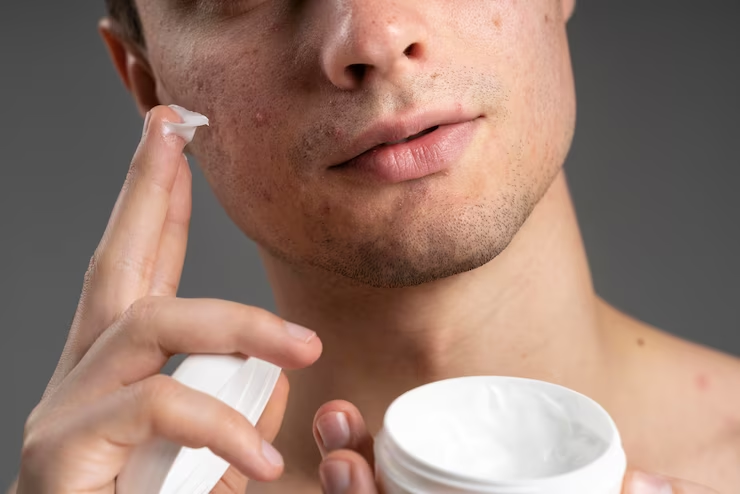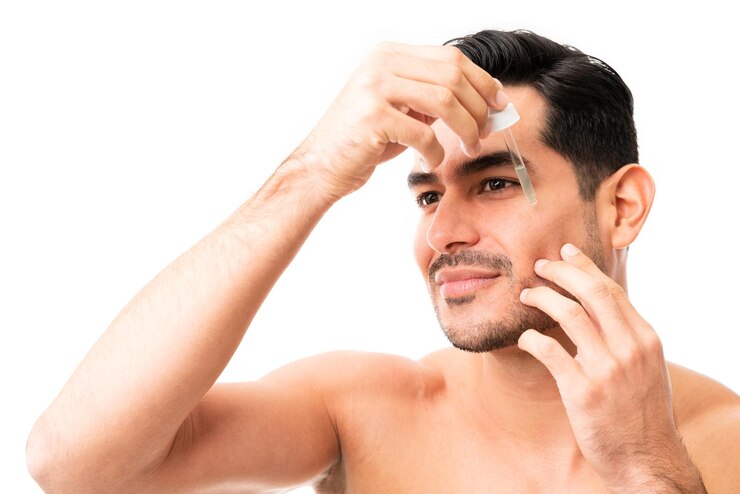
If you've ever battled acne, you know the journey doesn't always end when the breakouts subside. Lingering acne scars can leave us feeling self-conscious and searching for solutions. If you've been searching for an effective way to diminish these scars, you may have encountered tretinoin as a potential option. But does tretinoin help scars?
In this blog post, we will delve into the world of scar treatment and explore the efficacy of tretinoin in reducing acne scars. By understanding how tretinoin works and examining scientific evidence, we'll uncover whether it's a practical solution for achieving smoother, more even-toned skin. So, let's dive in!
How Does Tretinoin Work for Acne Scars?
Scars can serve as lasting reminders of past skin trauma, whether from acne, surgery, or other injuries. Understanding the nature of scars is crucial in finding effective treatments to minimize their appearance.
When it comes to scar treatment, one name that frequently surfaces is tretinoin. Widely recognized for its effectiveness in skincare, tretinoin has garnered attention for its potential role in reducing the appearance of scars. But what exactly is tretinoin, and how does it work?
Tretinoin, or Retin-A, is a topical medication derived from vitamin A. It is renowned for its effectiveness in skincare and is frequently prescribed for treating acne. However, tretinoin has also gained attention for its potential to reduce the appearance of scars.
Tretinoin promotes skin regeneration and texture improvement by stimulating cellular turnover and collagen production. While it may not eliminate scars, tretinoin can soften their appearance, making them less noticeable.
Benefits of Tretinoin for Scar Reduction

Acne scars can be a persistent reminder of past breakouts, leading many to wonder if there is an effective solution to fade them away. One such option that has garnered attention is tretinoin. So, does tretinoin help scars? In this section, we will explore the remarkable benefits of tretinoin for scars, shedding light on its potential to transform the appearance of acne scars.
Promotion of collagen production
Tretinoin stimulates collagen synthesis in the skin. Collagen is a crucial protein that provides structure and elasticity to the skin. By promoting collagen production, tretinoin helps to improve the texture and firmness of scarred skin, gradually minimizing the appearance of scars.
Accelerated cell turnover
Tretinoin speeds up the skin's natural exfoliation process, which helps to shed the damaged and scarred skin cells more quickly. This accelerated cell turnover can lead to a smoother and more even skin surface, reducing the visibility of scars over time.
Improvement in skin texture
One of the noticeable effects of tretinoin is its ability to enhance overall skin texture. By reducing roughness, fine lines, and unevenness, tretinoin can help create a more uniform skin tone, making scars less prominent.
Potential for scar fading
While individual results may vary, tretinoin has shown promise in gradually fading certain scars. The regular use of tretinoin over an extended period can lead to a reduction in scar redness, discoloration, and overall visibility.
It's important to note that the effectiveness of tretinoin for acne scar reduction can vary depending on factors such as the type and age of the scar and individual skin characteristics. Patience and consistency are key when using tretinoin, as visible improvements may take several weeks or months.
Proper Usage and Application of Tretinoin for Scars
Using tretinoin for scars correctly is crucial for maximizing its benefits and minimizing potential side effects. Here are important guidelines for the proper usage and application of tretinoin for scar reduction:

Patch testing
Before applying tretinoin to the entire scarred area, it is recommended to perform a patch test. Apply a small amount of tretinoin to a discrete area of skin and observe for any adverse reactions, such as excessive dryness, redness, or irritation. If no adverse reactions occur after a few days, it is generally safe to proceed with full application.
Gradual introduction
When starting tretinoin for scars, begin with a lower concentration and gradually increase it over time. This allows the skin to adjust and reduces the likelihood of severe irritation. Follow the instructions provided by your healthcare professional or included with the product.
Cleanse and dry skin
Before applying tretinoin, ensure that your skin is clean and dry. Gently cleanse the scarred area with a mild cleanser and pat it dry with a soft towel. Moisture on the skin may increase the potential for irritation when using tretinoin.
Pea-sized amount
Take a pea-sized amount of tretinoin and apply it to the scarred area. Avoid using excessive amounts, as this can lead to more irritation without providing additional benefits. Gently massage the tretinoin into the skin until it is fully absorbed.
Frequency of application
Start by applying tretinoin every other day or every two to three days to allow your skin to adjust. Gradually increase the frequency to once daily if tolerated well. However, consult your dermatologist for personalized recommendations, as they may vary based on your skin type and the severity of your scars.
Sun protection
Tretinoin can increase the skin's sensitivity to the sun. It is essential to protect your skin by wearing sunscreen with a high SPF and other sun-protective measures such as wearing protective clothing and avoiding prolonged sun exposure. It is always advised to use tretinoin at night instead of the day because of its property of being light-sensitive.
Moisturize
Tretinoin may cause dryness and peeling, especially during the initial stages of use. To alleviate dryness, moisturize your skin regularly with a non-comedogenic moisturizer. This can help maintain the skin's moisture barrier and minimize potential irritation.
Potential Side Effects and Precautions
While tretinoin has demonstrated its potential effectiveness in scar reduction, it is important to be aware of potential side effects and take necessary precautions. Here are some considerations regarding tretinoin for acne scars:
Skin Irritation
Tretinoin can cause initial skin irritation, including redness, dryness, and peeling. This is a common side effect, especially during the early stages of treatment. It is crucial to monitor your skin's reaction and adjust the frequency and amount of tretinoin application accordingly. Gradually introducing tretinoin and using moisturizers can help alleviate these symptoms.
Increased Sun Sensitivity
Tretinoin can make your skin more sensitive to sunlight. Applying sunscreen with a high sun protection factor (SPF) and taking other sun-protective measures such as wearing protective clothing and avoiding excessive sun exposure is essential. Failure to protect your skin from the sun may lead to sunburn or exacerbate skin irritation; therefore, it is advised to apply tretinoin at night.
Dryness and Sensitivity
Tretinoin may cause dryness and increased sensitivity in the treated areas. It is important to use gentle skincare products and avoid harsh or abrasive substances that further irritate the skin. Moisturizers, specifically those formulated for sensitive skin, can help maintain hydration and minimize potential dryness.
Avoid Use on Open Wounds
Tretinoin should not be applied to open wounds or broken skin. It is intended for use on healed scars or areas of intact skin. Applying tretinoin to open wounds can irritate, sting, and delay wound healing.
Consultation with a Healthcare Professional
It is advisable to consult a healthcare professional, such as a dermatologist, before using tretinoin for scar reduction. They can assess your skin condition, provide personalized recommendations, and determine the appropriate concentration and frequency of tretinoin application based on your needs.
Other Medications and Products
Inform your healthcare professional about any other medications, skincare products, or treatments you use. Some medications or products, such as certain antibiotics or harsh exfoliants, may interact with tretinoin and increase the risk of skin irritation.
Teratogenicity
Tretinoin is a highly teratogenic agent, which means that it will cause developmental abnormalities in the fetus. Therefore, it is strictly contraindicated in pregnancy. Even though the teratogenicity is primarily attributed to oral isotretinoin which is an oral medication used in the treatment of moderate to severe acne, but even topical tretinoin is prohibited to be used during pregnancy, lactation and even in females who are trying to conceive a baby because it is absorbed from the skin as well.
Other Scar Treatment Options
While tretinoin shows promise in reducing the appearance of acne scars, it is essential to note that it is not the only option available. Other treatment modalities may be considered depending on the type and severity of the scars.
Here are some alternative scar treatment options:

Dermatological Procedures
Dermatologists offer various procedures to address different types of scars. These may include laser therapy, microneedling, chemical peels, dermabrasion, or surgical techniques. These procedures can target specific scar characteristics and promote collagen remodeling, improving scar appearance. A detailed consultation with a skin specialist will help you understand what is the best treatment option for you.
Silicone-Based Products
Silicone sheets or gels are commonly used for scar management. They create a protective barrier over the scar, helping to retain moisture and flatten the scar tissue. Silicone-based products can be beneficial for hypertrophic scars or keloids.
Corticosteroid Injections
Injections of corticosteroids, such as triamcinolone, can help reduce inflammation and flatten raised scars, such as keloids or hypertrophic scars. A healthcare professional typically administers these injections.
Over-the-Counter Scar Creams
Several over-the-counter scar creams and gels contain onion extract, vitamin E, or hydroxy acids. While their efficacy may vary, they can be a more affordable and accessible option for mild to moderate scars. Having said that, it is always better to consult a dermatologist before applying any of these products on the face.
Natural Remedies
Some natural remedies, such as aloe vera, honey, or essential oils, are believed to have scar-reducing properties. While scientific evidence is limited, these remedies may provide mild benefits and can be used alongside other scar treatment options.
Conclusion
Finding the most effective approach to address acne scars requires a personalized and comprehensive approach. In the pursuit of smoother, more refined skin, tretinoin is a viable option for reducing the appearance of acne scars. When using this treatment, following proper usage guidelines and being aware of potential side effects is essential.
So, does tretinoin help scars? While no definitive answer applies to every individual, tretinoin has shown promise in scar reduction and can be a valuable addition to your skincare routine. Explore the possibilities, consult with professionals, and take proactive steps toward achieving the skin you desire.













